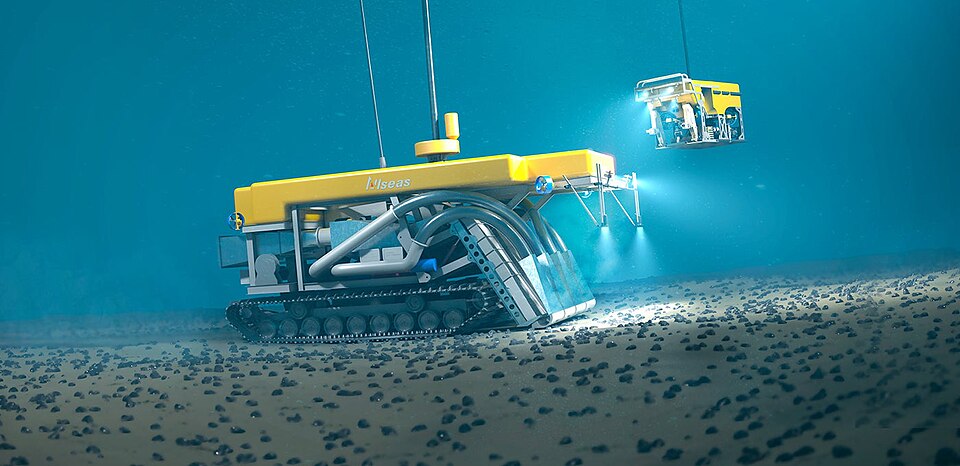World
Trump Moves to Allow Seabed Mining in International Waters

On April 24, 2025, President Donald Trump signed a new executive order that paves the way for private companies to mine the deep sea for valuable minerals. This order targets areas of the ocean floor rich in resources like cobalt and nickel, which are essential for a variety of technologies, including electric vehicles and renewable energy systems.
The move has sparked a heated debate about the potential environmental consequences of deep-sea mining, particularly in international waters. These areas fall under the jurisdiction of the International Seabed Authority (ISA), an organization created to regulate mineral extraction on the seabed. However, the United States has long remained outside the ISA framework, making this executive order a significant step in the nation’s approach to deep-sea mining.
Executive Order and Its Implications
The new executive order, citing the 1980 Deep Seabed Hard Mineral Resources Act, establishes a system for granting permits to private companies wishing to explore and extract minerals from the deep sea. The order emphasizes the United States’ goal to become a global leader in seabed mineral exploration, both within national waters and in international zones beyond national jurisdiction.
The order comes at a time when there is growing concern about the environmental impact of deep-sea mining. Although the United States has not ratified the 1994 United Nations Convention on the Law of the Sea (UNCLOS), which defines international maritime laws, the new order appears to sidestep the ISA’s authority. This move has been met with both support and criticism, especially as it pertains to environmental risks and the potential violation of international agreements.
Growing Opposition to Deep-Sea Mining
Deep-sea mining has faced widespread opposition from environmentalists, scientists, and several nations. Over the past decade, many countries, including some of the largest players in the global economy, have called for a moratorium or even a ban on the practice. The primary concern is the limited knowledge about the ecosystems on the ocean floor. Critics warn that mining these mineral-rich nodules could cause irreversible damage to deep-sea biodiversity and disrupt ecosystems that have been stable for millions of years.
Companies like BMW, Google, and Samsung have pledged to refrain from using minerals sourced from deep-sea mining in their products until the environmental risks are better understood. The Metals Company, a Canadian mining firm, recently announced plans to apply for exploration and extraction permits through the U.S. government. This announcement has raised alarms not only from environmental groups but also from nations such as China and Russia, who typically support mining activities in international waters but have condemned The Metals Company’s actions as a violation of international law.
The International Seabed Authority’s Role
The ISA, which has been working on a mining code to regulate seabed mining activities, expressed concern about the U.S. order. During the ISA Council’s session in March 2025, Leticia Carvalho, the Secretary-General of the ISA, voiced “deep concern” over the decision by The Metals Company to pursue permits independently of the ISA’s framework. Carvalho stated that any action taken without the ISA’s oversight could be considered a violation of international law.
For years, the ISA has sought to create a global regulatory framework to ensure that seabed mining is carried out responsibly, with adequate environmental safeguards in place. However, critics argue that this process has been slow, and many believe the risks of deep-sea mining outweigh the potential benefits.
Environmental and Scientific Concerns
One of the most pressing concerns about deep-sea mining is the lack of understanding of the ecosystems that exist on the ocean floor. Researchers warn that removing polymetallic nodules—the primary target of deep-sea mining—could result in the loss of critical biodiversity and ecosystem functions. Sabine Gollner, a deep-sea marine biologist at the Royal Netherlands Institute for Sea Research, highlighted the devastating impact of mining in a recent interview. She explained that once these nodules are removed, the ecosystems dependent on them will be lost for millions of years.
“There are still major gaps in understanding biodiversity and ecosystem functions at polymetallic nodule ecosystems,” Gollner said. “Once nodules are removed by mining, all biodiversity and functions directly dependent on the minerals will be lost for millions of years at the mined location.”
These concerns are not limited to the scientific community. Many environmental organizations have raised alarms about the long-term impact of seabed mining on global ocean health. The deep-sea environment is still largely unexplored, and scientists are only beginning to understand the complex relationships between species in these ecosystems.
The Future of Seabed Mining in the U.S.
The U.S. government’s decision to move forward with deep-sea mining permits could have significant geopolitical and environmental consequences. While it may position the United States as a leader in seabed resource extraction, it also risks straining international relations with countries that have long advocated for a moratorium on mining activities in international waters.
Environmental groups are likely to continue lobbying against the expansion of deep-sea mining, and many nations are expected to push for stronger international regulations. The debate over seabed mining is far from over, and the U.S. executive order could be a pivotal moment in the ongoing discussion about how to balance economic interests with environmental sustainability.
-

 Travel2 days ago
Travel2 days ago‘Trip-Chaining’: The new travel trend saving Brits up to a week of annual leave
-

 World2 days ago
World2 days agoDubai Sports City sees AED 4.7 billion in property sales over the last year
-

 Business2 days ago
Business2 days agoECOWAS Pushes for Key Reforms to Boost Trade Across West Africa
-

 Tech2 days ago
Tech2 days agoAI use in businesses jumps 3,000 percent as cyber threats grow
-

 World2 days ago
World2 days agoIsraeli airstrikes kill 28 in Gaza as conflict continues
-

 Lifestyle2 days ago
Lifestyle2 days agoDon’t let seasickness ruin your spring getaway!
-

 Lifestyle2 days ago
Lifestyle2 days agoRevealed: Study Maps Global Hotspots For Romantic Getaways
-

 Politics2 days ago
Politics2 days agoXi Jinping: China’s Climate Change Efforts Will Stay Strong Despite Global Politics




